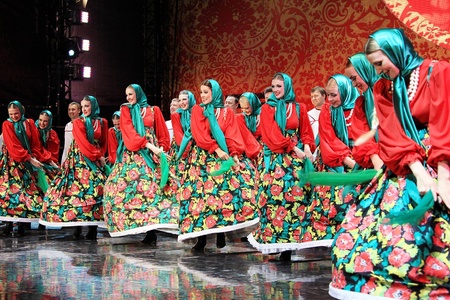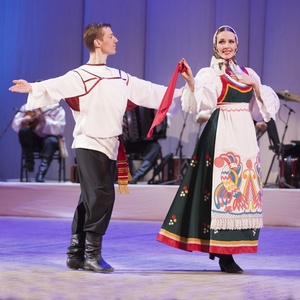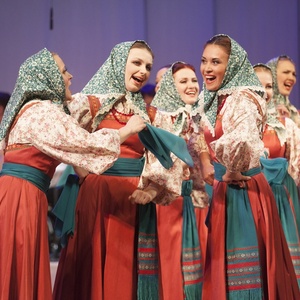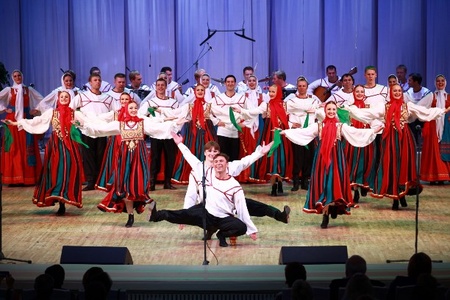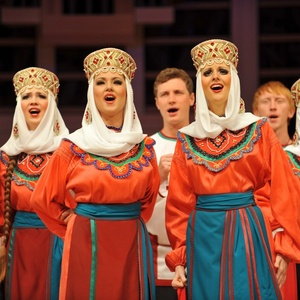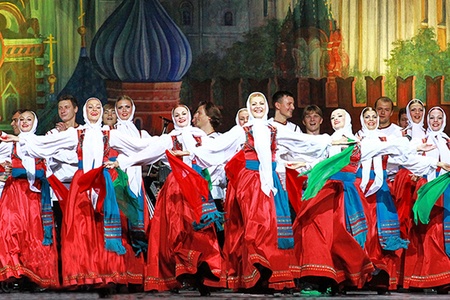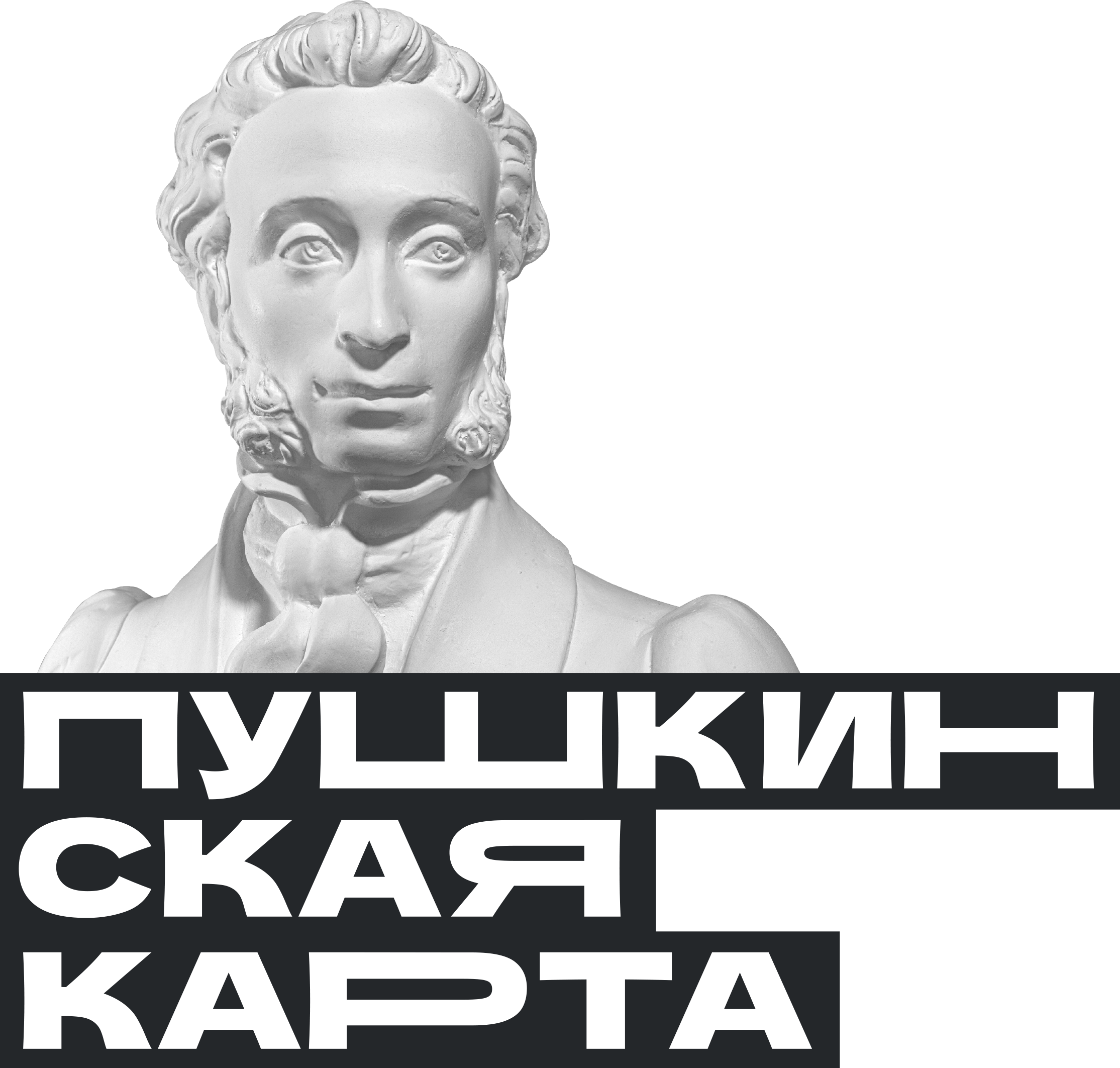The Pyatnitsky Russian Folk Choir
In 1910, under the leadership of M. E. Pyatnitsky, a choir of peasants from Voronezh, Ryazan and Smolensk provinces was organized. The original choir was small: a well-known photograph depicts Mitrofan Efimovich and only fourteen choristers wearing folk costumes. The first concert of the choir, held March 2, 1911 in Moscow turned out to be sensational. The audience of the Small Hall of the Noble Assembly, listened to genuine, deeply touching songs with great admiration. It was also noted by both great Russian musicians S. V. Rakhmaninov and F. I. Shalyapin who appreciated the Russian folk song very well.
It was in the early 1920's that the singers started to receive invitations to various concerts in Moscow. Upon the end of the performance, the artists would travel back to their villages and return to their routine peasant activities. In was in October 1917 that the peasant choir began a new chapter of its life. On September 22, 1918 at a concert of the choir before the Kremlin cadets they met Lenin, who invited Pyatnitsky for a conversation in the Kremlin. Evaluating the dignity and great potential of the new team, Lenin promised Pyatnitsky all the assistance. Participants of the choir moved to permanently reside in Moscow. Their professional activity becomes intense, and with the opening of regular radio broadcasting in November 1924, the choir was recognized, loved, and heard by the entire nation.
In 1927 M. E. Pyatnitsky died. The collective is then named after its founder, and is succeeded by Pyatnitsky’s nephew Pyotr Mikhailovich Kazmin, a person with an outstanding personality, a great connoisseur of Russian folk art.
A Media campaign was launched in 1929 under the motto "We need an old choir singing songs of a kulak village. New songs to the new village. " In 193, a talented composer Vladimir G. Zakharov took over, putting an end to the creativity crisis that the choir was experiencing at the time. He took a different approach to development of the collective. Some author's songs, including glorifying commenced collectivization, electrification, industrialization started to make their way to the choir’s repertoire, such as: "Along the Village", "Petrusha takes us fro a truck ride", "Green Space", etc. People learned the lyrics written by V. G. Zakharov such as: "And who knows", "Awake", and "In the open field" by heart. Those highly renewed songs had made their way to peoples heart eventually becoming people's folk songs.
During the Great Patriotic War, the Choir continued to actively hold concerts, performing before the military brigades. Live broadcasts of their concerts from the studio of the House of Sound Records were popular at the time and were listened to by rank and file commanders, pilots and sailors. Thousands of letters from those would come addressed to Pyatnitsky's Chorus and are still kept to this day. The song "Oh, my fogs, groomsmen", written in 1943 by V. Zakharov in the lyrics of M. Isakovsky, acquired the national popularity becoming the anthem of the partisan movement.
May 9, 1945, along with the winners, the choir took an active part in the festivities dedicated to the Great Victory in Moscow. In the post-war years, the tour-concert activity of the collective is expanding. Since the late 1940s, the choir began to tour around European countries. It was then that the choir becomes truly famous.
In 1936, a significant event occurred in the course of the choirs development. It merged with the professional collective in the Moscow State Philharmonic Society. In 1938 a dance group was formed in the team founded by Tatyana Alekseevna Ustinova. An outstanding choreographer, a student of the Moscow Choreographic School, she gave the choir more than 60 years of her creative life. Tatiana Ustinova studied the folk choreographic language of various regions of Russia and incorporated it into her dance compositions. She is the author of the famous "Voronezh step", when the female dancers float unhurriedly in a dance juts like swans.
In the same year, an orchestra group headed by Vasily Vasilyevich Khvatov appeared in the band. Being a talented musician, he created a unique orchestra, which included bayans, harmonies, horns, balalaikas, domra, gusli, ratchets. The sound of the new instruments added a new perspective to the concerts that would change the general mood of the songs and dances performed before. The choir’s glory have beenmultiplied over and over throughout the years by its leaders and through their work and dedication. Marian Viktorovich Koval, a well-known Soviet composer was in charge of the Choir in 1957 through 1962. In 1959 the collective was awarded the Order of the Red Banner of Labor for great creative achievements.
In 1962 a new era began in the history of the choir. The main national collective of the country was headed by composer Valentin Sergeevich Levashov, who remained in this post for more than twenty years. A sincere and admirable song writer, whose songs "On the outskirts", "How can I not love this land", "Accordion sings at crossroads" constituted so-called the "golden fund" of Soviet music art. A great place in the repertoire of the choir of this period consisted predominantly of the vocal and choreographic suites and compositions representing the culture and ethnographic of various regions of Russia: "Bryansk merrymaking", "Kaluga" and "Blossom, Land of Spring!", "Hello, Volga!", "A Poem about Moscow", latter with a modern vibe. Such compositions demanded a complex polyphony and high performing skills of the singers, dancers, and musicians.
In 1968, having received a high academic title, the folk choir entered the elite of Russian culture and art. The tour activity of the collective was definitely on the rise. All of the Soviet Union as well as countries abroad had at some point heard about the choir. The geography of tours continued to expand, the choir was applauded and admired in more than 40 countries. "Russian artists take our hearts into their own hands," the foreign media wrote with admiration. In 1986, Pyatnitsky Choir was awarded the Order of Peoples’ Friendship.
Starting from 1989, the Pyatnitsky Choir is headed by Alexandra Andreevna Permyakova. For many years she worked in the team, possessing a great talent, unyielding will and unrestrained energy. Throughout the hard years of ‘perestroika’, it was her who took upon herself a great burden of leadership. She did not only retain the collective, but also continued to successfully developed the achievements of the choir’s predecessors. The main thing constituted the return to the traditional principles of folk music, to the traditions that had been formed more than a hundred years ago by M. E. Pyatnitsky himself. The choir never aspired to ethnographic certainty. The strength of its art is in vitality, in a deep and inextricable connection with modernity. "Songs aren’t sung, they’re played" was something A. Permyakova likes to repeat at the same time putting the action at the performance forefront. Together, the singing, dancing, music, and acting turns into an exciting kaleidoscope of events.
This approach requires the highest degree of professionalism. On stage, the collective performs as a single organism, a collective creative personality, united by one task and one desire - to convey the high morality and spirituality of the Russian song, all the beauty of the Russian folk art. Today, the choir includes the best singers, dancers, musicians. Having joined the team from 30 regions of Russia, among them more than 40 laureates of all-Russian, international and regional artists' competitions including "Russia in miniature, Russia is young".
The love of the audience cannot be underestimated. The performances are packed by the modern Russians, for whom the art of the choir reminds once more of their roots. Concert programs of the contemporary choir include: "Russia - the sonorous soul", "Russia is my homeland", and they determine the main credo of the team – serving the Fatherland, carried through centuries. The Pyatnitsky's Choir is Russia's national treasure and pride.

